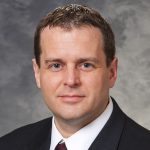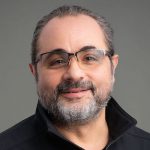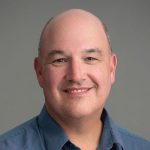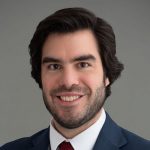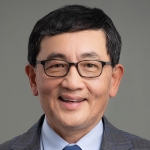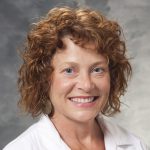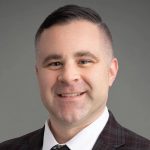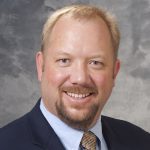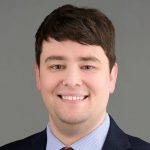The Department of Urology at the University of Wisconsin-Madison places a strong emphasis on research excellence. In federal fiscal year 2023, we were ranked #4 in NIH funding by the Blue Ridge Institute for Medical Research. Our researchers conduct cutting-edge clinical, translational, and basic science research.
Research Areas of Focus
| Urologic Oncology | Pathophysiology of the ureter |
| Inflammation of the Bladder | Urinary stone disease |
| Mechanisms that modulate pain | Urethral stricture disease |
| Prostatic hyperplasia | Lichen sclerosus |
| Bladder and pelvic floor dysfunction | Pediatrics |
| Minimally invasive surgery | Quality improvement |
| Nephrolithiasis | Health policy |
| Female urology | Improving patient outcomes |
| Genitourinary cancers | Clinical informatics |
UW Urology Researchers
E. Jason Abel, MD, FACS
Credentials: Professor (CHS)
Head, Section of Urologic Oncology
Robert and Dolores K. Schnoes Chair in Urologic Research
Dyad Lead, Inpatient Urology
Email:
abel
Phone: (608) 263-4563
Dr. Abel conducts clinical, translational, and basic research in urologic oncology. Clinical and translational interests include improving patient outcomes after complex urologic surgery, improving prognostic ability for patient decision making, and multidisciplinary care of kidney cancer.
Dr. Abel serves on the board of directors for the Society of Urologic Oncology (SUO) Clinical Trials Consortium.
Dr. Best’s research interests lie in the study of kidney cancer and disease using optics, the development of new technology for minimally invasive surgery, and urinary stone disease.
Vinaya Bhatia, MD
Credentials: Assistant Professor (CHS)
Director of Medical Student Programs
Position title: Specialty: Pediatric Urology
Clinical Information at UW Health
Email:
bhatia
Phone: (608) 263-9534
Dr. Bhatia’s research focuses on quality of life and improving standards of care in hypospadias, pediatric congenital conditions, and neonatal circumcision. She is currently working on developing a measure of quality of life for patients with hypospadias, to improve psychosocial and psychosexual outcomes in youth and adults who have been treated for hypospadias.
Shannon T. Cannon, MD
Credentials: Assistant Professor (CHS)
Director of DEI, Urology
Position title: Specialty: Pediatric Urology
Clinical Information at UW Health
Email:
cannon
Phone: (608) 262-5440
The focus of Dr. Cannon’s research is equity. Through her research, she seeks to explore how disparate access to care can affect patient outcomes. Dr. Cannon is also interested in workforce issues within Urology, with the goal of learning how to recruit people to the urologic workforce to better reflect patient populations and serve their needs.
Walid Farhat, MD,
GPLLM, FRCSC, FAAP, FACS
Credentials: Professor (CHS)
Chief, Division of Pediatric Urology
Mark and Karen Koulogeorge Chair in Urology
Director of Global Urology
Position title: Specialties: Pediatric Urology
Clinical Information at UW Health
Email:
farhat
Phone: (608) 262-0475
With research background in urinary bladder tissue engineering and developmental biology, Dr Farhat’s lab examines mutant animal model genitourinary developmental anomalies.
Dr. Farhat’s current work is heavily collaborative with the UW Department of Psychology (https://psych.wisc.edu/staff/auger-anthony-p/) and includes investigating the intersection of hormonal milieu, early life stress, and epigenetics interaction in order to predict social development and mental health risk. The overarching intent of this collaboration is to understand how hormones and puberty blockers, irrespective of anatomical anomalies, could influence adolescent brain development and endocrine systems. This research will allow us to understand the overall impact of hormones, its relation to anatomy and overall mental health and well-being.
Dan R. Gralnek, MD
Credentials: Associate Professor (CHS)
Director of HoLEP Program
Position title: Specialties: Benign Prostatic Hyperplasia (BPH), General Urology
Clinical Information at UW Health
Email:
gralnek
Phone: (608) 262-0759
Dr. Gralnek’s research is related to prostate growth and clinical outcomes. Dr. Gralnek and his team work in collaboration with researchers in radiology and medical engineering, as well as the O’Brien Center for Benign Urologic Research.
Matthew D. Grimes, MD
Credentials: Assistant Professor (CHS)
Position title: Specialties: Genitourinary Reconstruction, Male Sexual Health
Clinical Information at UW Health
Email:
grimes
Phone: (608) 265-8574
Dr. Grimes is a clinical and translational researcher focused on improving clinical outcomes in lichen sclerosus related urethral stricture disease and benign prostatic hyperplasia (BPH). He directs a collaborative research effort to understand mechanisms driving urethral fibrosis in lichen sclerosus in order to identify therapeutic targets for improved minimally invasive treatments. In BPH, his efforts focus on the use of non-invasive diagnostics to identify distinct clinical phenotypes and enable a personalized medicine approach to treatment.
David F. Jarrard, MD
Credentials: Professor
Vice Chair in Urology
John P. Livesey Chair in Urologic Oncology
Deputy Director, UW Carbone Cancer Center
Position title: Specialties: Minimally Invasive Surgery, Urologic Oncology
Clinical Information at UW Health
Email:
jarrard
Phone: (608) 263-4563
Dr. Jarrard has a joint appointment with the University of Wisconsin Comprehensive Cancer Center, and his clinical research emphasizes developing novel diagnostics and new therapies for genitourinary cancers. He has an active basic science laboratory and is funded through the National Institutes of Health and Department of Defense to examine genetic and epigenetic alterations in prostate cancer.
Frank Lin, MD, MS
Credentials: Assistant Professor (CHS)
Co-Director of Simulation Education
Position title: Specialties: Urogynecology and Reconstructive Pelvic Surgery, Minimally Invasive Surgery
Clinical Information at UW Health
Email:
lin
Phone: (608) 265-8574
Dr. Lin’s research interests in Urogynecology and Reconstructive Pelvic Surgery (URPS) focus on clinical outcomes of minimally invasive robotic surgeries, the utility of advanced imaging and urodynamic testing, and mesh-related outcomes and complications.
Christopher M. Manakas, MD
Credentials: Assistant Professor (CHS)
UW Health Physician Informaticist, Urology
Email:
manakas
Phone: (608) 263-9534
Dr. Manakas’ research interests include improving the patient and physician experience by optimizing EMR workflows. He also collaborates with Drs. Gralnek and Grimes on Male Voiding Dysfunction clinical outcomes research. Further, Dr. Manakas and Dr. Gralnek are researching techniques to improve the on HoLEP learning curve.
Sarah E. McAchran, MD, FACS
Credentials: Associate Professor (CHS)
Vice Chair for Faculty Development and Wellness
Dyad Lead, Outpatient Urology
Email:
mcachran
Phone: (608) 265-8574
Dr. McAchran’s research interests in female urology include optimization of care pathways to improve surgical outcomes and clinical outcomes of female pelvic floor reconstruction.
Stephen Y Nakada, MD,
FACS, FRCS
Credentials: Professor
Chairman, Department of Urology
The David T. Uehling Chair in Urology
Chief Administrative Physician, UWMF Practice Plan
Position title: Specialties: Adult Stone Disease
Clinical Information at UW Health
Email:
nakada
Phone: (608) 263-1359
Dr. Nakada’s research focuses on pathophysiology of the ureter and all aspects of urinary stone disease. His research is currently supported by the American Urologic Association.
Click here for the Wisconsin Stone Quality of Life Questionnaire (WISQOL).
Recent Features
David R. Paolone, MD
Credentials: Associate Professor (CHS)
Vice Chair for Regional Urology
Position title: Specialties: General Urology, Male Sexual Health
Clinical Information at UW Health
Email:
david.paolone
Phone: (608) 262-5440
Dr. Paolone’s research interests are in the areas of Benign Prostate Hyperplasia (BPH) and penile disorders.
Kristina Penniston, PhD
Credentials: Senior Scientist
Email:
penn
Phone: (608) 265-9797
Dr. Penniston’s research interests include clinical nutrition research in kidney stones and prostate cancer. Specifically, she is interested in the efficacy of nutrition therapy in the prevention, management, and treatment of disease and on indicators of quality of life.
In September 2020, Dr. Penniston was funded by the National Institute of Digestive and Diabetes and Kidney Diseases (NIDDK) to create the CAIRIBU (Collaborating for the Advancement of Interdisciplinary Research in Benign Urology) Interactions Core. The overarching goal of the CAIRIBU Interactions Core is to facilitate the expansion of benign urologic research by creating greater patient and public awareness of research efforts, enhancing the visibility of investigators and trainees within CAIRIBU and within the broader benign urologic research community, increasing and diversifying the benign urologic research workforce, creating interactions and cross-disciplinary connections between researchers from different fields, and supporting efforts to increase the submissions of highly-meritorious benign urologic research applications. As the CAIRIBU Interactions Core Principal Investigator, Dr. Penniston brings to bear skills, knowledge, and connections gained from her 16 years of urolithiasis research in the Department of Urology.
Dr. Penniston’s research in the role of diet in kidney stones, as well as in the health-related quality of life of patients with stones, has garnered international attention.
Click here for the Wisconsin Stone Quality of Life Questionnaire (WISQOL).
Kyle A. Richards, MD, FACS
Credentials: Associate Professor (CHS)
Email:
richardsk
Phone: (608) 262-0759
Dr. Richards conducts clinical, translational and health services research in urologic oncology. He has special interests in quality improvement projects aimed at streamlining health care delivery and efficiency for all patients with urologic malignancies.
William Ricke, PhD
Credentials: Professor
UWMF Professor of Urologic Research
Director of the George M. O’Brien Center
Email:
rickew
Phone: (608) 265-3202
Dr. Ricke’s research program encompasses basic and translational sciences as it pertains to the pathogenesis of the lower urinary tract. The synergy of both sciences allows his lab to explore both molecular underlying mechanisms associated with disease progression, but also to pre-clinically treat the same pathways, which may lead to the therapies of tomorrow.
Dr. Ricke’s lab continues to investigate the roles of hormonally regulated paracrine signaling during pathogenesis. They investigate how steroid and EDC signaling function together with other factors in pathogenesis, and how they can translate these findings into clinical trials for the betterment of mankind.
Daniel Shapiro, MD
Credentials: Assistant Professor (CHS)
Email:
shapiro
Phone: (608) 262-5440
Dr. Shapiro conducts clinical and translational research. He is interested in how the kidney tumor microenvironment influences tumor behavior and how this information can be applied clinically. He is investigating how the spatial immune phenotype of kidney cancer can predict cancer specific outcomes. Additionally, he performs clinical research evaluating urologic cancer outcomes after surgical intervention. He also has a special interest in rare forms of kidney cancer and how to improve their diagnosis and treatment. His research on renal medullary carcinoma was selected for a scholar-in-training award by the American Academy of Cancer Research. Dr. Shapiro has published numerous research studies and abstracts on these topics.
Daniel H. Williams IV, MD
Credentials: Professor (CHS)
Vice Chair for Education
Residency Program Director
UWMF Professor in Clinical Urology
Position title: Specialties: Male Infertility, Male Sexual Health
Clinical Information at UW Health
Email:
williams
Phone: (608) 263-4563
Dr. Williams’ research interests in male infertility include the preservation of fertility in men with cancer, the effects of advanced paternal age and the environment on male reproductive potential, and clinical outcomes of male reproductive tract reconstructions.

